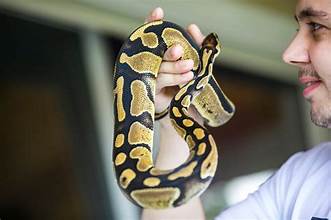Ball pythons, known for their docile nature and striking patterns, have become popular pets among reptile enthusiasts. However, proper handling is crucial for their well-being and ensuring a positive experience for you and your snake.
Understanding Ball Python Behavior
- Docile Nature: Ball pythons are generally calm and non-aggressive. Their instinct is to curl up into a ball when threatened, hence their name.
- Stress Sensitivity: While relatively tolerant, ball pythons can still experience stress. Sudden movements, loud noises, or excessive handling can trigger anxiety and defensive behavior.
Essential Handling Tips
- Wash Your Hands: Always wash your hands with soap and water before handling your ball python. To help prevent harmful bacteria or parasites.
- Gentle Approach: Approach your snake slowly and deliberately. Avoid sudden jerks or loud noises that might startle it.
- Support the Body: While holding your ball python, support its entire body, including the head and tail. It prevents injuries and provides a sense of security.
- Avoid Tail Grabbing: Never grab a ball python by its tail. Their tails are sensitive and can even detach, causing pain and injury.
- Respect Personal Space: If your ball python seems agitated or doesn’t want to be handled, respect its wishes. Forceful handling can lead to stress and aggression.

Handling Frequency and Duration
- Regular Handling: Regularly handling your ball python can help it become more accustomed to human interaction. Aim for 1-2 sessions per week, but adjust the frequency based on your snake’s comfort level.
- Short Sessions: Start with short handling sessions and gradually increase the duration as your snake becomes more comfortable.
- When to handle: Never handle your ball python within 24-48 hours of a meal; this can stress it out and lead to regurgitation.
Signs of Stress or Discomfort
- Hissing: Hissing is a common warning sign that a ball python feels threatened or uncomfortable.
- Striking: If your snake strikes out, it feels defensive. Do not try to interact with your ball python if it strikes out at you.
- Refusal to Eat: Stress can affect a ball python’s appetite. If your snake refuses food, it might indicate something is wrong.

Final Thoughts
Handling your ball python with care and respect is essential for building a positive bond and ensuring its well-being. By following these guidelines and understanding your snake’s behavior, you can create a safe and enjoyable experience for both of you. Patience and consistency are vital in developing a trusting relationship with your pet.




